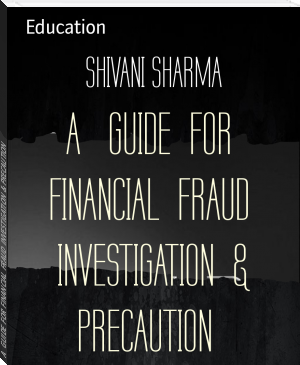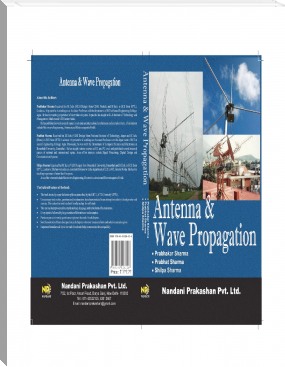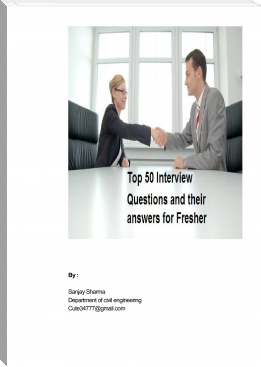A GUIDE FOR FINANCIAL FRAUD INVESTIGATION & PRECAUTION, SHIVANI SHARMA [read my book txt] 📗

- Author: SHIVANI SHARMA
Book online «A GUIDE FOR FINANCIAL FRAUD INVESTIGATION & PRECAUTION, SHIVANI SHARMA [read my book txt] 📗». Author SHIVANI SHARMA
Insider trading is the trading of a public company's stock or other securities (such as bonds or stock options) by individuals with access to nonpublic information about the company. In various countries, some kinds of trading based on insider information is illegal. This is because it is seen as unfair to other investors who do not have access to the information, as the investor with insider information could potentially make larger profits than a typical investor could make. The rules governing insider trading are complex and vary significantly from country to country. The extent of enforcement also varies from one country to another. The definition of insider in one jurisdiction can be broad, and may cover not only insiders themselves but also any persons related to them, such as brokers, associates and even family members. A person who becomes aware of non-public information and trades on that basis may be guilty of a crime.
Trading by specific insiders, such as employees, is commonly permitted as long as it does not rely on material information not in the public domain. Many jurisdictions require that such trading be reported so that the transactions can be monitored. In the United States and several other jurisdictions, trading conducted by corporate officers, key employees, directors, or significant shareholders must be reported to the regulator or publicly disclosed, usually within a few business days of the trade. In these cases, insiders in the United States are required to file a Form 4 with the U.S. Securities and Exchange Commission (SEC) when buying or selling shares of their own companies. The authors of one study claim that illegal insider trading raises the cost of capital for securities issuers, thus decreasing overall economic growth.[1] However, some economists, such as Henry Manne, have argued that insider trading should be allowed and could, in fact, benefit markets.[2]
There has long been "considerable academic debate" among business and legal scholars over whether or not insider trading should be illegal.[3] Several arguments against outlawing insider trading have been identified: for example, although insider trading is illegal, most insider trading is never detected by law enforcement, and thus the illegality of insider trading might give the public the potentially misleading impression that "stock market trading is an unrigged game that anyone can play."[3] Some legal analysis has questioned whether insider trading actually harms anyone in the legal sense, since some have questioned whether insider trading causes anyone to suffer an actual "loss," and whether anyone who suffers a loss is owed an actual legal duty by the insiders in question.
Illegal[edit]
Rules prohibiting or criminalizing insider trading on material non-public information exist in most jurisdictions around the world (Bhattacharya and Daouk, 2002), but the details and the efforts to enforce them vary considerably. In the United States, Sections 16(b) and 10(b) of the Securities Exchange Act of 1934 directly and indirectly address insider trading. The U.S. Congress enacted this law after the stock market crash of 1929.[4] While the United States is generally viewed as making the most serious efforts to enforce its insider trading laws,[5] the broader scope of the European model legislation provides a stricter framework against illegal insider trading.[6][7] In the European Union and the United Kingdom all trading on non-public information is, under the rubric of market abuse, subject at a minimum to civil penalties and to possible criminal penalties as well.[7] UK's Financial Conduct Authority has the responsibility to investigate and prosecute insider dealing, defined by the Criminal Justice Act 1993.
Definition of "insider"[edit]
In the United States, Canada, Australia and Germany, for mandatory reporting purposes, corporate insiders are defined as a company's officers, directors and any beneficial owners of more than 10% of a class of the company's equity securities. Trades made by these types of insiders in the company's own stock, based on material non-public information, are considered fraudulent since the insiders are violating the fiduciary duty that they owe to the shareholders. The corporate insider, simply by accepting employment, has undertaken a legal obligation to the shareholders to put the shareholders' interests before their own, in matters related to the corporation. When insiders buy or sell based upon company-owned information, they are violating their obligation to the shareholders.
For example, illegal insider trading would occur if the chief executive officer of Company A learned (prior to a public announcement) that Company A will be taken over and then bought shares in Company A while knowing that the share price would likely rise.
In the United States and many other jurisdictions, however, "insiders" are not just limited to corporate officials and major shareholders where illegal insider trading is concerned but can include any individual who trades shares based on material non-public information in violation of some duty of trust. This duty may be imputed; for example, in many jurisdictions, in cases of where a corporate insider "tips" a friend about non-public information likely to have an effect on the company's share price, the duty the corporate insider owes the company is now imputed to the friend and the friend violates a duty to the company if he trades on the basis of this information.
Liability[edit]
Liability for inside trading violations generally cannot be avoided by passing on the information in an "I scratch your back; you scratch mine" or quid pro quo arrangement if the person receiving the information knew or should have known that the information was material non-public information. In the United States, at least one court has indicated that the insider who releases the non-public information must have done so for an improper purpose. In the case of a person who receives the insider information (called the "tippee"), the tippee must also have been aware that the insider released the information for an improper purpose.[8]
One commentator has argued that if Company A's CEO did not trade on the undisclosed takeover news, but instead passed the information on to his brother-in-law who traded on it, illegal insider trading would still have occurred (albeit by proxy by passing it on to a "non-insider" so Company A's CEO would not get his hands dirty).[9]:589
Misappropriation theory[edit]
A newer view of insider trading, the misappropriation theory, is now accepted in U.S. law. It states that anyone who misappropriates information from his or her employer and trades on that information in any stock (either the employer's stock or the company's competitor stocks) may be guilty of insider trading.
Proof of responsibility[edit]
Proving that someone has been responsible for a trade can be difficult because traders may try to hide behind nominees, offshore companies, and other proxies. The Securities and Exchange Commission prosecutes over 50 cases each year, with many being settled administratively out of court. The SEC and several stock exchanges actively monitor trading, looking for suspicious activity.[10][11][12] The SEC does not have criminal enforcement authority, but can refer serious matters to the U.S. Attorney's Office for further investigation and prosecution.
Trading on information in general[edit]
In the United States and most non-European jurisdictions not all trading on non-public information is illegal insider trading.[7] For example, a person in a restaurant who hears the CEO of Company A at the next table tell the CFO that the company's profits will be higher than expected and then buys the stock is not guilty of insider trading—unless he or she had some closer connection to the company or company officers.[13] However, even where the tippee is not himself an insider, where the tippee knows that the information is non-public and the information is paid for, or the tipper receives a benefit for giving it, then in the broader-scope jurisdictions the subsequent trading is illegal.[13][14]
Notwithstanding, information about a tender offer (usually regarding a merger or acquisition) is held to a higher standard. If this type of information is obtained (directly or indirectly) and there is reason to believe it is nonpublic, there is a duty to disclose it or abstain from trading.[15]
The punishment for insider trading depends on a few different factors. There are three main factors, which can be identified. Depending on jurisdictions, there may be either civil or criminal penalties, or both.
Scope – How many people were affected by the wrongdoing? Gain – How much did the insider make from the transaction, whether directly or as a tipster? Where there is a tipster and a tippee, how much did the tippee make from the transaction? Evidence – Anyone charged is innocent until proven guilty. The burden of proof falls on the prosecution. If no one "flips", or if there is no smoking gun, the prosecution has a harder time proving guilt. This may result in prosecution moving away from criminal charges, and instead choosing to pursue civil charges.In the United States in addition to civil penalties, the trader may also be subject to criminal prosecution for fraud or where SEC regulations have been broken, the U.S. Department of Justice (DOJ) may be called to conduct an independent parallel investigation. If the DOJ finds criminal wrongdoing, the Department may file criminal charges.





Comments (0)